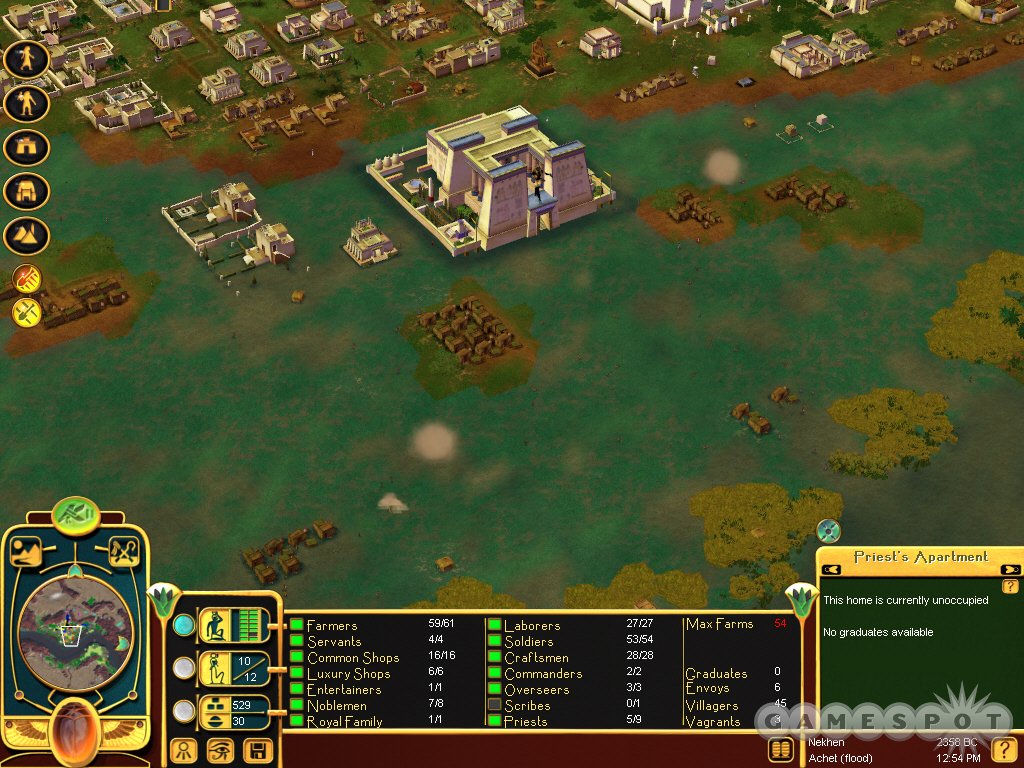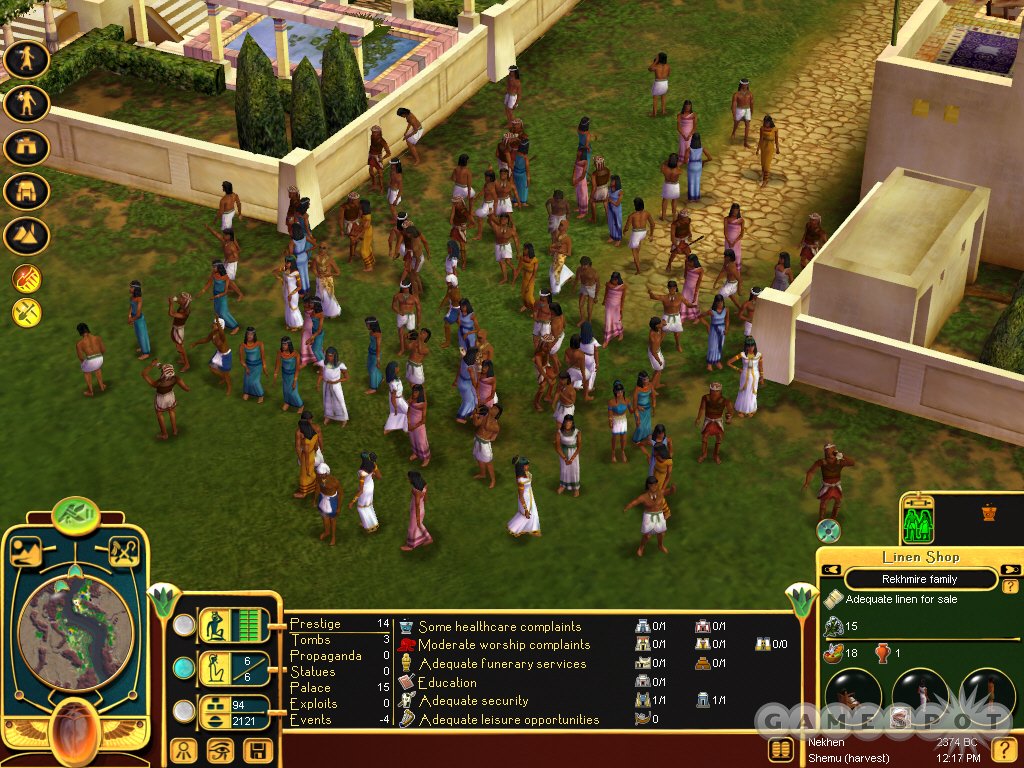Immortal Cities: Children of the Nile is a promising start for developer Tilted Mill, which was founded by veterans of Impressions, the studio responsible for early city-building games like Pharaoh and Caesar. If you're a veteran of those games, the important thing to keep in mind is that Children of the Nile is a fresh start for the genre. The developers took the opportunity to build a new game from the ground up, rather than recycle previous gameplay conventions and mechanics. The result is a game that has a lot of personality and some interesting city-building gameplay, but is weighed down by a few problems not found in some of the previous games of this type.

In Children of the Nile, you'll play as a series of pharaohs in Egypt's old, middle, and new kingdoms, which were the height of its power and influence as a civilization. Your goal is to increase your prestige, mainly by growing the size and power of your cities. The game features a grand campaign that allows you to take on a series of progressively more-difficult challenges, as well as a number of scenarios, several of which allow you to build a city from scratch. The game also features three excellent tutorials that will teach you everything you need to know.
What makes Children of the Nile different from previous games in the genre is its emphasis on the inhabitants of your cities. Unlike earlier city-building games, in which populations were abstracted using statistics, Children of the Nile models each and every inhabitant of your city, tracking them as they go about their daily lives. The result is that every character in the game belongs to a household and has needs that must be addressed, including food, health care, housewares, and religion. It's up to you to provide the necessary services by growing and maintaining a complex economy, but that's one of the joys of Children of the Nile, because the citizen-based model allows you to easily comprehend what's working in your city and, more importantly, what's not.
The backbone of your economy are the farmers, who plant and tend to their crops after the annual flooding of the Nile. To support these farmers, you'll need smaller numbers of common shopkeepers, such as pottery makers and basket weavers. These shopkeepers go out and gather resources such as papyrus and flax, and then return to manufacture and sell their goods. Nobles are needed to oversee vast farming estates, and in addition to common housewares, they require luxury goods and entertainment. You'll also need bricklayers, brick makers, stone carvers, overseers, priests, temples, hospitals, scribes, and a whole lot more to create a functional and thriving city. It's a tricky task, and most of your time in the game will be spent trying to keep everything in balance, even as you expand your city by leaps and bounds. But it's also a lot of fun, as your city looks and feels like a real, functioning city, as hundreds of citizens go about their daily lives.
In addition to achieving the objectives in each scenario, your ultimate goal as pharaoh is to keep your dynasty going over the years, as a typical scenario can easily run through several generations of pharaohs. In an age when most humans were considered very lucky to live to 40, a great deal of your time and effort will be spent on ensuring your immortality by building grand and lavish tombs, such as pyramids. Failure to prepare for the afterlife will exact a heavy toll on your prestige, which will make it tougher to build a flourishing city, because it will cut into the number of government workers--such as priests, scribes, and overseers--that you can manage.
Thankfully, there are several ways of boosting prestige, ranging from making lavish improvements to your palace to erecting statues and monuments to commemorate great victories. While the heart of the game focuses on your city, there is a world map that displays other locations in Egypt that you can explore or form trade partnerships with to import goods that you can't produce locally. There are also bandit camps and other opponents that you can crush, though that involves merely training and outfitting an army and then dispatching them on the world map. All the combat takes place offscreen, and you'll simply be told whether your army was victorious or not, so there's nothing to take you away from your city building. Win a great victory and you can establish a huge commemorative memorial, to ensure that the prestige from the win doesn't fade away quickly.
Where Children of the Nile stumbles a bit is in the behavior of the citizenry. Sometimes your citizens seem more than unreasonable, demanding things that are in abundance, in part because they don't forget past wrongs. So if a citizen nearly died due to a lack of medical care, he won't care that you've constructed a hospital after the fact. Still, it's still a bit frustrating to see citizens picketing outside your palace, demanding things like housewares when there are shops filled with such items nearby. And perhaps the most vexing problem is religion, mainly because the ancient Egyptians worshipped more than a dozen different gods. Your pharaoh's prestige level often limits you to only a handful of priests at a time, and priests have other tasks in addition to tending to the gods, such as running the hospitals, schools, and mortuaries. The result is that you'll be hard-pressed to keep everyone satisfied spiritually, as only a handful of gods can be worshipped at a time. You'll have to constantly micromanage your shrines and temples, rotating the gods who are worshipped there to keep your population satisfied. The alternative is to hold costly religious festivals to blow off some steam.

Children of the Nile is a good-looking game, thanks to its strong 3D graphics. You can zoom in to observe the action up close, or zoom out for a more-traditional view. Tilted Mill licensed the Empire Earth engine and modified it, creating a game capable of capturing the nuances of everyday life. There's a lot of color and detail packed into the game, and you'll see everything from little kids tossing rocks into the air to entertainers juggling plates in some rich nobleman's estate. There are also a few graphical glitches, not the least of which is that sometimes your citizens will walk underwater when the annual flooding of the Nile occurs. The audio is very charming, particularly the countless number of one-liners that your citizens will utter while performing their daily tasks. These audio cues are cute, and they also provide you with feedback on what your citizens like and dislike.
In the end, Children of the Nile is an engaging city-building strategy game, and its lighthearted and colorful approach makes it suitable for gamers of pretty much all ages. The game's economic system makes logical sense, and there's a very strong cause-and-effect system in place that allows you to easily gauge the effectiveness of your policies. And while it suffers from a few problems, Children of the Nile is a promising first step from a new developer.